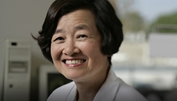Principle Investigator: Christina Wang MD

Men who wish to control their fertility currently have limited options. They have to rely on their female partner using contraceptives, use condoms, undergo vasectomy, or abstain.
At The Lundquist Institute at Harbor-UCLA, we are testing a possible new method for male family planning. The medication is a transparent gel (applied daily to the skin of the man's shoulders) that is designed to temporarily stop the production of sperm.
The medication contains the hormones Nestorone® and Testosterone. These hormones suppress the production of sperm to prevent the possibility of fathering a child. Nestorone has been tested and shown to be safe and effective at blocking the production of the male hormones needed to make sperm. The testosterone in the gel works by replacing the testosterone that is normally produced by the body.
The study gel is being developed by The Population Council, a non-profit dedicated to reproductive health, in collaboration with the National Institute of Health’s Eunice Kennedy Shriver National Institute of Child Health and Human Development
There will be no cost to you and your partner for the study medication, study doctor’s time or procedures related to this study. Compensation for your time is provided.
Study Description:
The study will take approximately 2 years. Men will visit the clinic approximately 31 times and their female partner approximately 10 times.
The study has 4 Phases:
- Screening: Male participants receive a physical exam, medical history, urine, blood, and semen analysis. Female participants provide a medical history and take a pregnancy test.
- Suppression: Men will start applying the gel once every day and will come in for monthly appointments to have their sperm count checked. This phase typically lasts 3-6 months.
- Efficacy: When the man’s sperm count drops to an appropriate level to prevent pregnancy the couple will begin to use the gel as their only form of contraception for 12 months. The man’s sperm count will be checked regularly during this phase as well.
- Recovery: Men will stop using the gel and the study team will monitor the recovery of sperm production. The return of normal sperm production typically occurs in 3-6 months.
Who can participate?
We're looking for heterosexual couples to participate. Men and their female partners are both active participants in the study and must both consent. See below for the main criteria for both men and women.
Inclusion criteria for the male partner:
- Be healthy and between 18 and 50 years (inclusive) old.
- In a stable, mutually monogamous relationship for at least 1 year.
- No known infertility.
Inclusion criteria for the female partner:
- Be healthy and between 18 and 34 years (inclusive) old
- In a stable, mutually monogamous relationship for at least 1 year.
- Have regular menstrual cycles of 21-35 days.
- No known infertility.
Contact:
Michael Massone – Study Coordinator
Phone: 310-341-9323 (call or text)
Email: michael.massone@lundquist.org
Principle Investigator - Dr. Christina Wang
Christina Wang, MD is a Professor of Medicine and Assistant Dean in Clinical and Translational Sciences at the David Geffen School of Medicine at UCLA. She is the Associate Director of the UCLA Clinical and Translational Science Institute, and a faculty member of the Division of Endocrinology, Department of Medicine, Harbor-UCLA Medical Center and The Lundquist Institute, Torrance, California. She was a former Professor of Medicine at the University of Hong Kong. She is an internationally renowned andrologist/endocrinologist and a clinical and basic investigator/educator.
